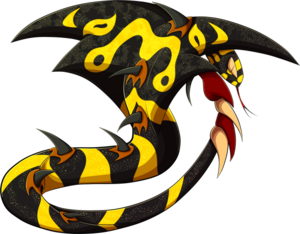Aceranguis
The Aceranguis is a Common creature released on Protochroma. It is found only in Crop Circle Canyon and and cannot currently be found in any Delve. Its standard variant is Gold.
Descriptions
Baby
An ovular, leathery egg. It's smooth in texture, but has some faint speckling against the light gray shell. It's cool to the touch and should probably be kept in an incubator.
Juvenile
A long, thin cobra has emerged from the egg. Though it has a ridged hood and glittering scales, the strangest part about it is the barbed stinger on its tail. Testing reveals that the stinger contains venom, but at its infant stage the snake's toxin seems to only cause irritation to the applied area, unless someone is allergic to it. The baby snake hisses and rears when threatened, arching its tail defensively, but is more likely to flee than strike unless cornered.
Adult
The Aceranguis is a rather common snake in Crop Circle Canyon, much to the detriment of unprepared exploration teams. It is highly venomous, delivering its poison via both its fangs and its scorpion-like tail stinger. In addition to injecting venom, it is able to spray it from its fangs several meters away with incredible precision, aiming for the eyes or visibly open wounds of its attacker. The venom is acidic and corrosive, appearing to do damage to envenomed tissue by directly melting it than relying on neurotoxic or haemotoxic properties. If left on otherwise healthy skin for more than about an hour, it can cause necrosis, but the real danger comes from its tendency to cause permanent damage to eyes and muscle tissue.
Aceranguis are primarily defensive in the face of a threatening predator or researcher, and prefer not to waste their venom. If cornered, however, they have been known to chase and actively pursue their attacker until it bites, stings, or loses its quarry. Their banded patterning serves both warning and camouflage purposes; in shaded sand and rock, the black striping can help it blend into outcroppings of rock and shrubs, while under direct light the bright contrast of its markings against black, as well as the glittering of its scales, can warn a curious predator of danger. Their scales are shiniest just after a shed, and females are typically more glossy than the males, being the ones to attract male snakes for courtship and breeding.
Additional Lore
Delving
Images
| Image Type | Images | ||||||
|---|---|---|---|---|---|---|---|
| Baby |  |
-- | -- | -- | -- | -- | -- |
| Juvenile |  |
-- | -- | -- | -- | -- | -- |
| Common Female |
 |
 |
 |
 |
 |
 |

|
| Common Male |
 |
 |
 |
 |
 |
 |

|
| Rare Female |
 |
 |
 |
 |
 |
 |

|
| Rare Male |
 |
 |
 |
 |
 |
 |

|

